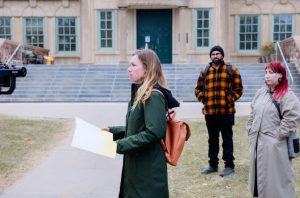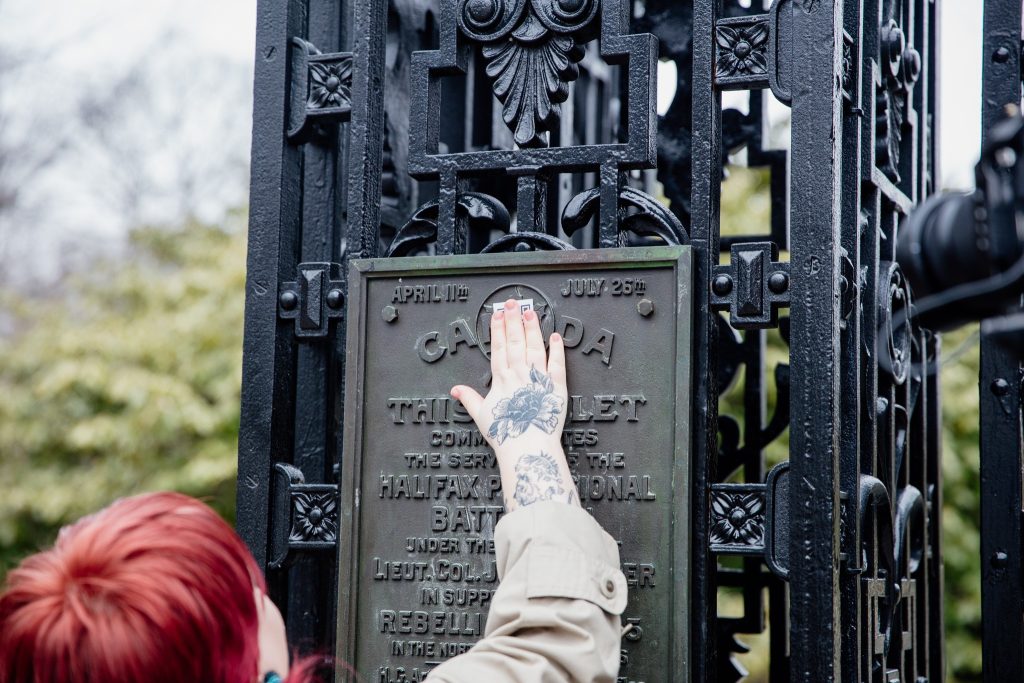How often do you stop and reflect on where you’re standing, what difficult historical significance the space may have, or what weight its name may carry? The Difficult Histories Database (DHD) challenges us to question and look closer at the spaces we occupy and consider the impacts of the past on where we exist today.
Sydney Wreaks (BFA 2020), Master of Art in Art Education student at NSCAD University, has partnered with Lucy Boyd, History and Early Modern Studies student at University of King’s College, to populate the DHD, an initiative part of the Counter Memory Activism interdisciplinary research-creation project.

An online archive of difficult sites of history within the Halifax Regional Municipality, the DHD helps others notice, reflect on, and at times counter-map sites of colonial violence, cultural genocide, environmental racism and systemic amnesia. This allows for a collective conversation about some of the difficult sites of history around us and understanding the grave impacts of colonialism and settler violence.
“We have a duty to learn our troubled history and unlearn harmful practices,” said Sydney. “One of the main narratives we’ve found in Halifax, for example, is how tied most sites are to the transatlantic slave trave. It’s sinister, and we need to question how are we caring for these narratives and for people who are coming into these spaces and feeling unsafe or vulnerable?”
How it works
Local sites are selected and collected in the DHD. Lucy is then charged with the research component, finding relevant academic resources and news articles, making note of the history often overlooked or forgotten. Sydney then visits the site and collects field notes, looking at the tangible traces relevant to the difficult histories just beyond the surface. Solomon Nagler, NSCAD professor in the Media Arts Division, has provided mentorship and guidance throughout the creation of the database.
“These parks and places are often named after people who have committed colonial atrocities in Canada and beyond, why do we uphold their legacy?” asked Sydney. “We need to consider what it means to name something. In my culture, naming is very specific and if you do something criminal, you are no longer able to pass on the name as it holds both energy and ties. It’s time to course correct and to pay attention to these truths that may be uncomfortable but are now unavoidable.”
What’s next for DHD?
The database, still in its creation stages, will be converted to a web-based platform during the summer and fall 2022. At that point, it will be available to the public. Until then, Lucy and Sydney will continue to work towards populating the database for future use by students, academics, teachers, and artists.
Though this work is specifically looking at sites in the HRM, Sydney challenges people to look at their own hometowns. “This work can be done anywhere,” they continue. “This is just a starting point.”
Both Lucy and Sydney are members of the Review Committee for the Creative Counter-Memorialization Symposium/Gathering taking place in Kjipuktuk (Halifax) in November 2022. They will be presenting DHD more broadly at the event.
For more on the DHD, please view the following video created as an introduction to the project. To connect with Sydney, visit their Instagram accounts @sydneywreaksart and @dismantlingcolonialim. For more on Counter Memory Activism, visit countermemoryactivism.ca

